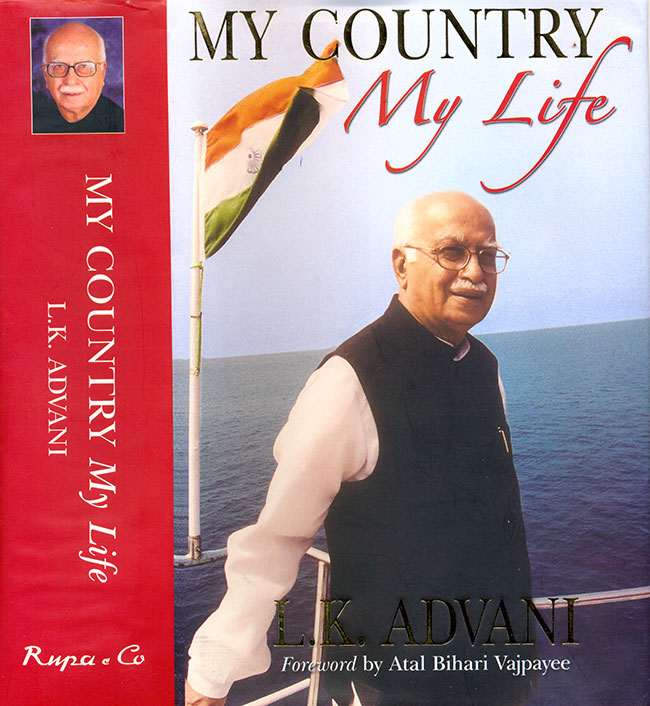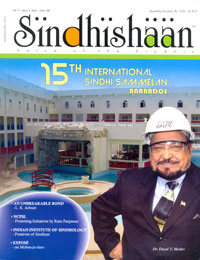![]()
L. K. ADVANI
My Country My Life, An Autobiography
By Gul Karamchandani

My Country, My Life is an extraordinary autobiography by a leading political personality of our times–L.K. Advani – which has been brought out by Rupa Publishers this month in India (Number : ISBN 978-81-291-1363-4). This nearly thousand-page book presents a candid self-portrait to what Advani's admirers and critics have always known him for: the gift for clarity of thought, strong convictions and forceful articulation.
The book begins with Advani's account of an unbreakable bond between Sindh and India and tells as to how he had to abandon his homeland of Sindh which became a part of Pakistan after India was partitioned in 1947. Clearly, the pain of having to abandon the beloved homeland still remains and what lingers in Advani's mind is the great heritage and history of Sindhi Society, its tolerance and inclusiveness, its Sufi culture
Advani quotes Bhagwan S. Gidwani (author of Return of the Aryans), repeatedly, to present the integrated picture of the structure of Sindhi Society and its freedom from communal disharmony, but more so, the history of the land where the roots of Hinduism were formed in the shape of Sanatan Dharma, where Vedas were composed, and which served as the cradle-ground of the Aryan civilization.. Says Advani :
“It would be appropriate here to recall the words of Bhagwan S. Gidwani, one of the greatest Sindhi historians who now lives in Montreal. He belonged to a distinguished family in Karachi. His father, Shamdas Gidwani, was the President of the Hindu Mahasabha in Sindh, and his uncle Dr Choithram Gidwani was President of the Sindh provincial unit of the Congress. Both lived and worked under the same roof. In 1994, Gidwani published the widely acclaimed book, Return of the Aryans, a fictionalized recreation of the birth, 8,000 years ago, of the Aryan civilization in the land of the Sindhu basin, and its evolution across the length and breadth of India. In 1995, Bhagwan Gidwani met me in Delhi and presented his book to me with the inscription: 'From one Hindu to another'.
'Remember', Bhagwan Gidwani writes, 'Sindh is the land where our ancestors resided, where the ancient Sanatana Dharma was formed in 8,000 BCE, leading to the formation of the roots of Hinduism. It was on the banks of our rivers of Sindh—Sindhu and Saraswati—where the Vedas were composed, where the 'Om' mantra was first uttered. Sindh it was under whose guidance Bharat Varsha, and later Arya Varsha, was formed. Nor do I forget the inspiration of Latif Shah Bhitai, Sachal “Sarmast”, Sami and other Sufi saints. We are the survivors and inheritors of that glorious heritage. And to contemplate its extinction for us is not only to rob ourselves alone, but more so, our children and their children to whom this legacy left to us by our ancestors, rightfully belongs. I would not like Sindhiyat to disappear from the land of Sindh for then it would be a barren desert—lifeless and soulless, just as Pakistan would like it to be.'
Again, L.K.advani quotes Bhagwan Gidwani who adds: 'in my student days, at Sadhbela (a famous Hindu temple) at Sukkur in Sind, I saw Zulfiqar Ali Bhutto*--he was known as Zulfie then. He was at a Langar, the community meal of Sadhbela, and I also saw him taking away a little halwa, which was served with the meal. He could not have been there just for the free meal, for he was always flush with money. Maybe he was there to render thanks for a wish fulfilled, or to seek blessings for a wish for the future. I don't know. I sat with him and exchanged greetings, for like many of us, I had enjoyed the hospitality of his household at Larkana, but certainly did not ask him why he was at Sadhbela. Recently, a South Indian friend questioned me: How come, no one asked Bhutto, why he was there? Only a non-Sindhi would ask such a question. For us, it was not too uncommon in Sindh to see Hindus in dargahs and Muslims at Hindu holy places.... Sindhi Muslims accepted our ancient heritage of Mohenjo-Daro as their own. When Muslims from India poured into Sindh, bent on loot and massacre, it was Sindhi Muslims who protected Hindus.'
Advani points out that the great tradition of tolerance and religious syncretism has been carried forward by Bhagwan Gidwani and post-Partition Sindhi poets and writers - among them, Shaikh Ayaz (1923-1997) who wrote: 'I belong to the religion of all men, all women and all children. I am the “madan-mast” plant which grew up wherever there fell the drops of blood shed by Ladi, wife of Dahir, fighting the ruthless Arabs. I am the cave of Goddess Kali's thousand idols which I wrought in stone and which I have been worshipping all my life'.
Sadly, this tolerant, harmonious and pluralist tradition of Sindh has been under severe attack since Partition. It is sought to be destroyed by Wahabism, the extremist sect from Saudi Arabia, which has invaded Muslim societies around the world, including India. The spiritual and cultural aspects of Sindhiyat are being virulently castigated in the burgeoning number of madarasas and mosques built with Saudi money and Saudi- trained preachers. The loser in this assault is not merely Sindh, but the future of humanity itself which depends upon a tolerant and inclusive global culture in order to survive.
Advani devotes considerable space to Sindh's role in India's freedom struggle with quotations from various writers including Bhagwan S. Gidwani. The roles played by Acharya Kripalani, Jairamdas Daulatram and Dr Choithram Gidwani, as narrated by Advani, are worth noting.
The book provides a riveting, insightful and assertive account of Advani's love for his roots of Sindhu-Saraswati civilization, his fight for democracy, during the Emergency, his Ram Rath Yatra that galvanized the nation and and catalyzed the nation on the true meaning of Secularism. Advani was elected President of the of the Jana Sangh in 1973. He was jailed for nineteen months during the Emergency. He was the Information and Broadcasting Minister in the Janata Party Govt. in 1977- 79. He was India's Home Minister and Deputy Prime Minister (2002-2004). He is currently the Leader of Opposition in the Indian Parliament.
Atal Behari Vajpayee (Prime Minister of India 1998 – 2004) says that mirrored in L.K. Advani's book is the remarkable journey of a sensitive human being and an outstanding leader “whose best, I hope and pray, is yet to come”.
L.K. Advani is widely regarded as a national leader who combines intellectualism, integrity and mass-appeal. His book is being reviewed extensively in India and in many foreign countries.


